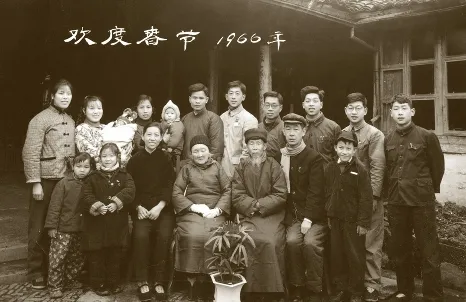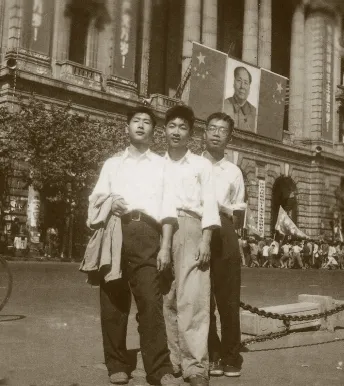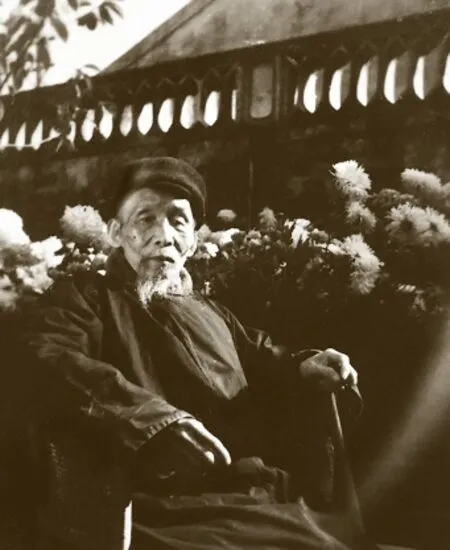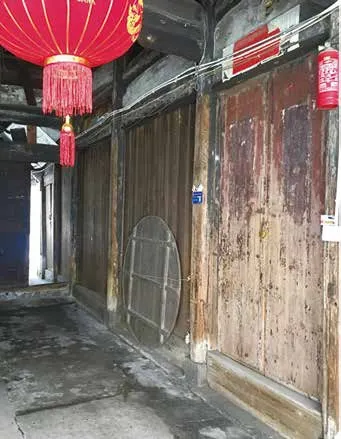瑞安大沙堤俞氏:书香门第 清白为人
● 蔡玲玲
今天的俞家后人总结出最新的“10字”家风
家风家训是一种中国传统的正能量,这种正能量如何延续?从瑞安大沙堤俞氏家族,我们或许可以窥见其中的传承印迹。
瑞安作为千年古县,素称“东南小邹鲁”,其文脉绵长,名人辈出,底蕴深厚。
瑞安市区道院前街与小沙巷一带,清朝年间,居住着“瑞安四大家族”中的两大家族,那就是一代大儒孙诒让与其父孙衣言、其叔孙锵鸣的孙氏家族,黄体芳、黄绍箕、黄绍第等“五黄先生”的黄氏家族。而在两大家族宅院的中间,一条名叫大沙堤的巷子里,也曾飘出一缕书香,历经五代人的酿造,弥漫了一百多年。这就是俞氏家族。
俞家从绍兴迁瑞后,从第七代俞黼[fǔ]唐至今,历年著述达49种,共计8562万字。而贯穿于这些文字之间的,是他们辈辈相传、代代恪守的“读书、慎行、清白、敬业、勤俭”这十字家风。近日,俞家后裔历时两年半时间编著的《瑞安大沙堤俞氏家风》一书出版发行,这延续了百多年的家风至此落地生根,继续影响着年轻一代。

收藏于温州市图书馆的俞黼唐著作。This is a page of the contents of writings by Yu Futang. The book is now housed at Wenzhou Library.

俞春如选拔贡卷。This examination paper was especially designed and printed for Yu Chunru in a national entrance test for the Imperial College. The imperial test took place every 12 years.

1966年和2016年的俞家合影。The black and white photo of the Yu family in Rui'an was taken in celebration of the Spring Festival in 1966; the color one, taken during the Spring Festival in 2016, shows the four generations of the Yu family in Rui'an.

第一代 读书著述创家训
俞黼唐(名君尧)是大沙堤俞氏家风的开创者。他生于清朝咸丰元年(1851年),从小就志向远大,常常在劳作之余,手捧一本书,向教书的父亲请教。他对于读书的热爱,曾用“继晷焚膏忘昼夜”“日西追月到黄昏”来形容;又把读书视为垦种,乐在其中。他希望子孙能传承下去,在《自咏》中说:“儿孙休负我,也将经训作菑畬”。
俞黼唐24岁进入瑞安县学补学官弟子,54岁成为县学学官,一生设馆,授徒为业。著名金文学家、《金文大字典》编纂者戴家祥便是他的学生。年过半百之后,他写出了《周易讲义》《禹贡说要》《河间存古翼圣编》《河间诗存》等,这些著述现收藏在温州市图书馆古籍部。
《河间诗存》是溯源俞氏家风的一个窗口。这本诗集里,俞黼唐通过《读书》《勤学慎行》《明道自任》《卜居》等诗,表达自己平生“勤学、慎行、清白”的人生宗旨。
第二代 慎行清白承文脉
俞黼唐的儿子俞春如(名煦甡)不负父望。他幼承庭训,先后求学于池仲霖、周宗翰。宣统元年(1909年)拔贡,获省试第三名。他是身体力行、发扬光大俞氏家风的关键人物。
俞春如一生淡泊名利、安贫乐道。他年轻时在家乡开办了私塾,授业为生。当时,俞春如正值青年,两子尚幼,家庭经济常捉襟见肘,但他仍坚守清白家风,不趋附,不羡荣华富贵。正如《行状》中所说:“境虽清贫,始终不作寒乞之态。持身勤朴,布衣蔬食,处之晏然。”他喜欢看书,家中没钱去买那么多的书,便向朋友借,摘其要点,孜孜不倦,夜以继暑。
后来俞春如任瑞安中学国文老师。瑞安革命先驱林去病、郑馨等均是他的学生。1937年,俞春如受聘参与《瑞安县志》的编撰。对于所承担的部分,俞春如多方搜罗,不遗余力,直至县志稿印行后,仍搜集补正。现遗存瑞安玉海楼的民国县志稿中,尚有他的眉注手迹50余处计数千字。
晚年的俞春如转向了文史研究,1953年被聘为浙江省文史馆首批馆员,协助县文馆会将搜罗到的私家图书1万余册,进行翻晒、整理、分类、编目,为地方积聚了大批文献。俞春如一生读书、写作,学术研究范围涉及经、子、史、文、方言和地方文史等,著作有《春庐诗文正续集》《春庐读书记》《瑞安地方史料》等共计10余种、100余万字。
此外,他恪守清白,爱国情深。他以清白、慎行为人生底色,内心则洋溢着爱国忠贞之情。其《抗战歌》沉痛鞭挞,慷慨激昂;《过城市赋》悲喜恨盼,情真意切;《丁卯除夕感怀》爱国忧民,心系草根。
第三代 敬业勤俭扬家风
大沙堤俞氏家风有新的发展,是从俞春如之子俞大文、俞象川开始的。

1967年,俞家第四代俞雄、俞光、俞崇在上海合影。Yu Xiong, Yu Guang, Yu Chong, three descendents of the Yu family in Rui'an,pose for a photo in Shanghai in 1967.
俞大文从小受家庭熏陶,爱好古典文学,尤精诗词,为中华诗词学会会员,浙江省诗词学会会员,温州市诗词学会顾问、荣誉理事。其作品曾先后发表在《当代中国诗词精选》《全球当代诗词选集》《中华诗词》等书刊,出版有《忆菊庐吟稿》等诗集,他的传略被编入《中国当代艺术界名人录》《当代诗词家大辞典》和《浙江古今人物大辞典》。
俞大文一生执教,桃李满天下。他有诗云:“清白家风传砚田,杏坛三世守青毡”“一领心安贫士毡,应仰家风典范在”,散发着俞氏家风的清香。俞大文“学而不厌,诲人不倦”,其行正学高,敬业爱岗,受到学生衷心敬重。
由于家境清贫,俞象川从小被送至瑞安永元钱庄当学徒。1935年初,浙江省地方银行打算在瑞安筹建办事处,熟悉金融、办事干练的俞象川被银行选中,一起参与筹建后,被聘为办事处主任。这是瑞安县历史上第一个新型的官办金融企业,25岁的俞象川成为瑞安地方银行的创始人,被后称为近代瑞安金融先驱。
办事处成立之初,在资金奇缺的情况下,俞象川利用自己的人脉发动全县各界存款,得到积极响应。成立次年,办事处的存款总额达1506万元。这一年,他作为金融界代表被选为瑞安县商会理事。
他对工作认真负责,对业务精益求精,为人谦和俭朴,深得同仁敬重。即便他后来离开办事处,仍受敬重,仍作为金融界代表当选瑞安县商会理事长达10多年。
俞象川在外打拼养家,其妻金孟英则用吃苦耐劳、勤俭持家撑起了整个家庭的半边天。她总是有条不紊地照料全家九口的衣、食、住、行,补衣纳鞋搓麻线、种瓜养鸡卖米饼,样样顺手。她虽然读书不多,但明大事,睦邻里。当婆婆双目失明,她悉心照料18年;后来丈夫患上帕金森氏病,她又没日没夜地护理了10年,直到丈夫撒手人寰。在那些磨难的岁月里,她的爱和付出给了整个家庭温柔而坚强的力量。
第四代 笔耕创业沐墨香
2005年,温州日报曾发表《温籍作者最字榜》,归纳出温州市年纪最大的作者、年纪最轻的作者、出书最多的作者、最有亲缘关系的作者等,其中俞雄、俞海、俞光三兄弟被列为“最有亲缘关系的作者”之一。
他们三兄弟退休后,投身文史研究与著述。老大俞雄从事文史研究,著有《骄鸥远影》《孙诒让传略》《陈傅良传略》等;老二俞海原为市文联副主席,著有《坐对青山》《心旅》《五月桃花水》《俞海文存》等;老四俞光著有《温州经济史话》《瑞安经济史》等,《温州经济史话》获得了全国优秀社会科学普及作品的荣誉。此外,三兄弟整理出版了《俞春如集》,在报刊发表记述先辈的文章30来篇。
作为俞象川的下一代,他们努力践行家风。在职时,清白做人、敬业实干;退休后,发挥余热,回归书斋,从事于文史研究与著述。他们先后出版著作201种,字数达597万字,延续了俞氏的文脉。同时,他们也发扬了“教师世家”的传统,老二俞海教过书,老三俞松也曾是教师。而老五俞崇继承了父亲的实干精神,积极投身改革,在省企温化第一个带头承包汽车经营,第一个购买私人运货汽车,后又回单位为经理,带领企业从汽运业向仓储业转变。
第五代 传承践行在路上
作为俞象川的孙辈,俞彪主持的省、市实验项目“让更多的人受到更好的教育”被《浙江日报》《浙江教育报》报道;俞颖被评为浙江省县市区域报“十佳”领军人物,著有《生命只有一次》(合著)、《罗阳纪事》;俞帆曾获“新型连拱隧道结构”“EPS轻质路堤”“一种用于治理桥头跳车的结构”等3项国家专利,其工程设计获得省建设工程优质优秀设计一等奖。而这些成绩的取得,是和家风的熏陶分不开的。在传承践行的路上,俞家的年轻一辈,不忘祖训,传承家风,在各自的学习和工作岗位上默默耕耘、砥砺前行。

晚年俞春如。A photo of Yu Chunru in his evening years
在全民关注家风建设的大环境下,如何将家风传承并发扬光大,成了摆在俞氏后裔面前的一大重要课题。2015年起,俞氏家族的内部,展开了一场关于家风的热烈探讨,重温先辈思想言行,通过学习、提炼,总结了“读书、慎行、清白、敬业、勤俭”10字家风,并将历年积聚材料编为一册,让俞氏后人身体力行、代代相传、发扬光大,让家风践行永远在路上。
2017年,瑞安广场文化客厅成立,展示俞氏“读书、慎行、清白、敬业、勤俭”10字家风,并称:“读书是主线;慎行、清白是为人处世的准则;敬业是落实处;勤俭是持家原则。”这是对俞氏家风内涵的简明准确概括。
Yu Family's Motto Emphasizes Important Virtues
By Cai Lingling
The Yu family in Rui'an in southeastern Zhejiang enjoyed a local reputation for about 200 years. The family moved to Rui'an from Shaoxing in the northeast of the province. It struggled for survival in Rui'an for generations. It was not until Yu Futang born in 1851,a seventh-generation descendent of the Yu family in Rui'an, that the family began to thrive thanks to a group of mottoes formulated by Yu Futang for all the family members to follow faithfully. Nowadays, the Yu family ranks with three other inf l uential families in Rui'an in local scholars' understanding of the history of Rui'an.
The ancestry of this branch of the Yu family in Rui'an can be traced to the Tang (618-907) and the Song (960-1279). After putting its roots down in Rui'an, the family prospered as a second-generation descendent made a fortune through trade. It went down in the world when it came to the fifth generation. It struggled in poverty when the sixth-generation descendents turned to scholarship. The family practiced medicine for four generations before it realized it needed a clear-cut set of family guidelines which would keep the family above the ups and downs of times. Yu Futang developed a motto that emphasized education, prudence and integrity as the most important precept that all the family members and future descendents must follow faithfully.

瑞安俞氏大沙堤旧居。A view of the former residence of the Yu clan in Rui'an
Scholars emerged from the family. Over decades, they wrote 49 books which amount to 8.56 million words. These books are carefully preserved. A poetry collection by Yu Futang is now in the collection of Wenzhou Library. The 120 poems in the collection are essentially about topics such as education, value, virtues such as integrity, family tradition, presenting a prominent difference from mainstream poems by other poets written about natural beauty, personal experience, history, sentiments, travel, borders, homesickness,and life vicissitudes.
Yu Futang was a late bloomer. His education started when he was a child. While working to make a living, he squeezed time to study. It was not until he was 24 that he was enrolled into a school supported by the government of Rui'an County. In his adult life,Yu taught as a private teacher. It is said that Dai Jiaxiang (1906-1998), a native of Rui'an who later became a historian and linguist specialized in the ancient Chinese, studied under the guidance of Yu Futang while Yu was employed by the Dai family to teach children in the family. Yu Futong became an official of the county school at 54. He lived to see the birth of the Republic of China in 1911.
Yu Chunru, a son of Yu Futang, wrote a memoir of his father. The junior said his father emphasized prudence and integrity as a guideline for everyday life. The father advised him to never step into litigations and never exploit the people's illiteracy for personal gains,never seek connections in high places to push down your neighbors.
After Yu Chunru passed the provincial examination which qualified him to government appointments, the father advised the son not to seek appointment to government positions. “Working as a government of ficial would be the easiest way to get corrupted. Moreover, you are young and ignorant of the world. If you got yourself into politics, you might easily hurt yourself and the reputation of the family. You'd better work as a teacher and promote Confucianism,”advised the father.
Yu Chunru worked as a teacher in a local middle school in Rui'an. Among his students were some revolutionaries who fought and died for the birth of New China. In 1937, he was engaged to compileAnnals of Rui'an County. In 1953, he was recruited as a scholar working for Zhejiang Institute of Culture and History.
Many descendents of the Yu family go down in the history of literature, history, culture. In 2005, Wenzhou Daily published a survey that categorized prominent people in various walks of life. Three Yu brothers were listed as best known writers who shared kinship.
Many descendents of the Yu family are now prominent figures.Yu Biao is an accomplished educator who has conducted many education projects. Yu Fan is a road construction engineer who has three patents under his name.
Yu Futang's not-to-do list sounds like a set of commandments such as never curry favor with those in power and in money, never go near a wasteful and extravagant way of life, and never tyrannize your neighbors by bringing them to lawsuits.
The family's mottos chief l y from Yu Futang might not be the best in China, but it served the family and reflected the time when the family tried to go through the world's vicissitudes and survive decently.
In 2015, the family looked back at the mottos written by their ancestors and simpli fied them into a five-word motto: education,prudence, integrity, dedication, thrift. The family members agree to hold fast to the motto and bring the family to the best possible future.

